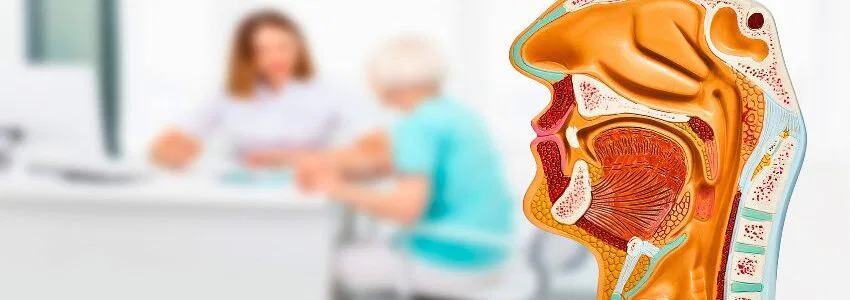Why Does My Nose Whistle? Key Facts You Should Know

Published July 3, 2025
Does your nose make a faint whistling sound every time you breathe? It may seem funny at first, but if you’re asking yourself, “Why does my nose whistle?” it could point to an issue with your nasal passages. This seemingly harmless noise can quickly become frustrating, especially if it happens often.
In this article, we’ll explore the question, “Why does my nose whistle?” We’ll look into the common causes, effective treatments, and simple home remedies to help you tackle this.
Why Does My Nose Whistle?
A whistling nose happens when air moves through a narrow or blocked nasal airway. This creates vibrations that make the sound. If you’re wondering about the whistling sound, it could be due to temporary irritation or a more significant issue. Persistent nose whistling often points to an underlying problem. Here are the most common causes:
Nasal Congestion And Mucus Build-Up
A blocked nose is often the result of colds, sinus infections, or allergies. These conditions cause the nasal tissues to become inflamed, triggering an overproduction of mucus. The excess mucus narrows the airway, restricting airflow. As air struggles to move through, it can create a whistling sound.

Deviated Septum
The nasal septum separates your nostrils. Sometimes, it becomes crooked or misaligned. This condition is called a deviated septum. It can be due to an injury or from birth. When one nostril is much narrower, airflow is disrupted. This can cause uneven breathing and a whistling noise.
Nasal Polyps Or Growths
Nasal polyps are soft, non-cancerous growths. They form on the lining of your nasal passages or sinuses. Over time, they can block airflow. This may cause breathing difficulties or a whistling sound when you breathe.
Dry Nasal Passages
Dry nasal passages are often caused by low humidity or overuse of nasal sprays. This can lead to crusting along the nasal lining. The airways narrow, making breathing uncomfortable. It may also cause more frequent whistling sounds.
Structural Abnormalities Or Post-Surgery Issues
Issues like a perforated septum—where there’s a hole in the nasal cartilage dividing the nostrils—can lead to a whistling nose. Sometimes, this condition occurs naturally or after nasal surgery.
When To See A Doctor About A Whistling Nose
A whistling nose is usually harmless, but sure signs may indicate it’s time to seek medical advice.
- Persistent symptoms. If your nose often whistles, it might be a sign of an underlying issue. Staying hydrated or using nasal rinses may help. If not, it’s time to seek professional advice.
- Breathing difficulties. Struggling to breathe, whether during the day or night, may suggest a structural issue or nasal blockage linked to the whistling sound.
- Pain or discomfort. If the whistling noise comes with pain in your nose or sinuses, it could mean an infection or inflammation. It may also be caused by growths like polyps.
How To Treat And Prevent Nose Whistling
Eliminating a whistling nose starts with addressing its underlying cause. Thankfully, a range of treatments—from simple home remedies to medical solutions—can help resolve the issue effectively.
Nasal Irrigation And Hydration
Using a saline spray or neti pot can help clear mucus and debris. This improves airflow. Staying hydrated keeps nasal passages moist. This reduces dryness and irritation.
Over-The-Counter Medications
Decongestants and antihistamines can offer temporary relief for nose whistling caused by allergies or colds. Be sure to follow dosage guidelines to prevent overuse.
Managing Allergies Or Infections
If allergies are the culprit, allergy medications or avoiding known triggers can help. For infections, consult a doctor to determine if antibiotics or antiviral treatments are necessary.
Surgical Solutions For Structural Issues
When structural problems like a deviated or perforated septum are to blame, surgical procedures such as septoplasty may be required. This operation straightens or repairs the septum, enhancing both airflow and breathing.
Home Remedies And Lifestyle Adjustments
- Use a Humidifier: Dry air can irritate your nasal passages. A humidifier introduces moisture to the air, helping to relieve symptoms.
- Take Warm Showers: Steam from a warm shower can decongest your nasal passages and reduce whistling.
- Apply A Warm Compress: Applying a warm compress to your sinuses can help minimize pressure and inflammation.
- Try Probiotics: Supplements like Bionaze may support respiratory health and reduce nasal inflammation. It contains BLIS K12™ (Streptococcus salivarius K12) and BL-04™ (Bifidobacterium Lactis BL-04), which help maintain balance in the sinuses and throat, making it a great addition to your nasal care routine.
By combining these strategies, you can address the root of the issue while restoring smooth, quiet breathing.
Frequently Asked Questions
Is a whistling nose dangerous?
A whistling nose is generally harmless. However, it could indicate underlying issues like nasal obstruction or structural problems. If accompanied by severe symptoms, seek medical advice.
Can a whistling nose go away on its own?
Yes, in many cases, a whistling nose resolves as the underlying issue, such as congestion from a cold or allergies, improves.
Does a deviated septum always cause whistling?
No, many people live with a deviated septum without any symptoms. However, if the deviation significantly narrows an airway, it could lead to whistling.
Are nasal sprays safe for long-term use?
Over-the-counter nasal sprays can be helpful for short-term relief but may cause rebound congestion if used excessively. Saline sprays are a safer, long-term alternative.
What’s the best way to stop nose whistling at night?
To minimize whistling at night, ensure your nasal passages are clear before bedtime. Elevate your head using an extra pillow, and consider using a humidifier to keep airways moist.
Why does my nose whistle when I breathe in?
If your nose whistles when you breathe, it’s likely due to air moving through a narrowed nasal passage. Congestion, a deviated septum, or nasal polyps can cause this. The restricted airflow creates vibrations, producing a whistling sound.
Why does my nose whistle when I breathe out?
A whistling sound when exhaling is usually caused by blocked or narrowed nasal passages from mucus, inflammation, or issues like a perforated septum. The noise comes from air struggling to pass through. Using a humidifier, nasal irrigation, or consulting a doctor may help.
Why Choose Bionaze?
Support your nasal and respiratory health naturally with Bionaze. This probiotic is made specifically for ENT health. It contains clinically researched strains like BLIS K12™ (Streptococcus salivarius K12) and BL-04™ (Bifidobacterium Lactis BL-04). These help reduce inflammation and maintain sinus balance. They also promote overall nasal wellness. Whether you deal with irritation, congestion, or whistling sounds, Bionaze can help. Add it to your routine for clearer, more comfortable breathing.

Breathe Easier: Understanding And Treating A Whistling Nose
While a whistling nose can be a minor annoyance, many people wonder, “Why does my nose whistle?” This sound is often your body’s way of signaling a potential issue with your nasal passages. By understanding its causes and using the right treatments and preventive measures, you can manage or eliminate the problem. If symptoms continue or worsen, contact a healthcare provider for further evaluation and care. Always prioritize your breathing health to keep your nose functioning smoothly!
Still wondering, “Why does my nose whistle?” Don’t ignore the signs. Support your nasal health with probiotics like Bionaze, designed to promote sinus and respiratory wellness—because every breath should be smooth and silent.
Benefit From The Latest Advancements In Probiotic Science With Bionaze
Bionaze is a proprietary blend of probiotics proven to promote ear, nose, and throat health, improve digestion, and support your immune system. The active ingredients BLIS K12, and BL-04 are considered among the best probiotics according to science.
Get 25% Off Your First Order when you use BIO25 at checkout!

This Content Has Been Reviewed For Factual Accuracy
This content has undergone thorough fact-checking by our team of internal experts. Learn more about the meticulous editorial standard for our website here.
ADVERTISEMENT

About The Author
Hi, I’m Corinne Grace, a proud nursing graduate from Riverside College with a flair for writing. I specialize in health and wellness topics, using my educational background to weave informative and attention-grabbing articles that appeal to a wide variety of readers. Committed to excellence in writing, I’m always refining my skills to stay in sync with the fast-evolving world of digital media. Whether you’re seeking to understand complex health concepts or looking for relatable advice, I’m here to deliver content that’s accurate and enjoyable to read.




